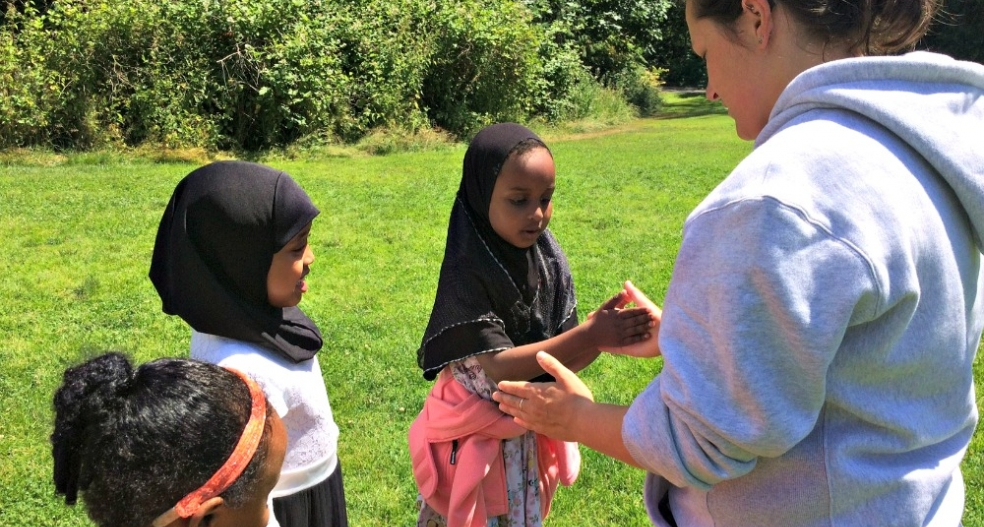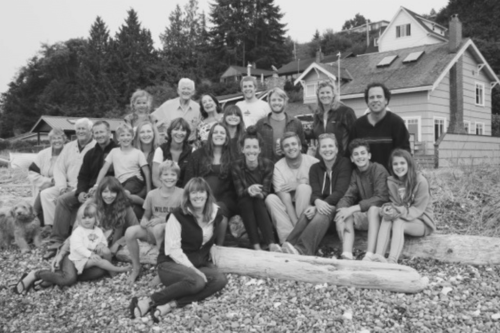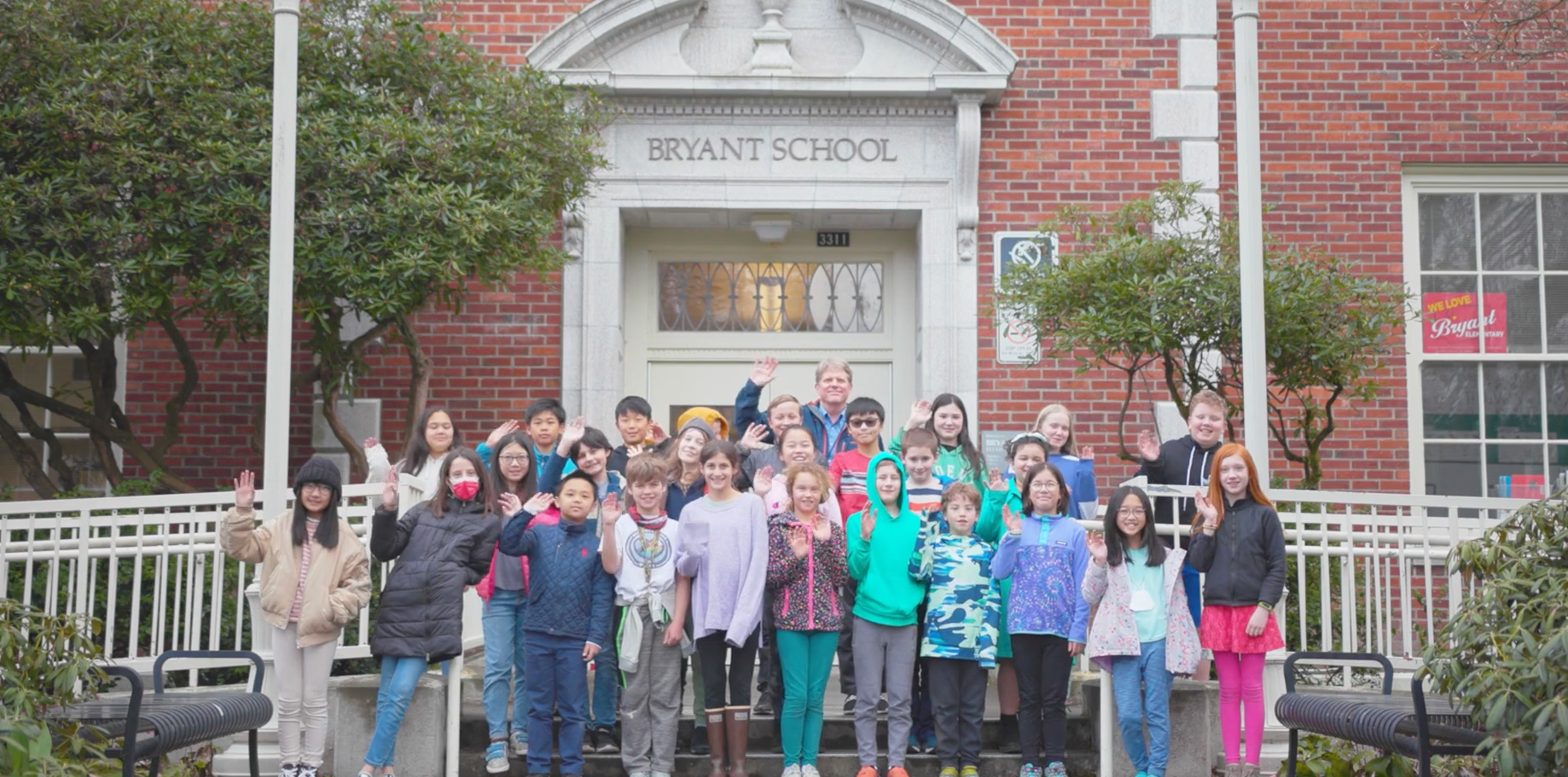In early 2021, we applied for inclusion in The Lawrence Hall of Science and Justice…
Author: Tamar Kupiec
Over 130 members of Seattle’s Somali community, more than twice what event organizers expected, came to IslandWood one Sunday in July to learn about the School Overnight Program (SOP). They couldn’t all fit on the buses that would bring them from the ferry terminal to campus, so some followed in cars. The sandwiches on the ride over were split in two, and a pizza order rounded out the goat stew transported from Seattle in coolers. But there was room for everyone beneath the wood roof of the Friendship Circle. Here schools attending IslandWood’s outdoor education program “come together as one school,” explained Sapna Sopori, Director of Residential School Programs. Today, instead of the campfire song about the food chain sung by students, the group sang the national anthem in honor of Somali Independence Day. They clapped and cheered after each welcoming speech, cell phones were raised in the air to capture the scene, and children strayed from the circle unable to resist stroking the large ferns and jumping from the rocks that border the amphitheater.
“We want you here with us to learn from us and with us… We want to learn from you,” continued Randy Komatsu, School Partnerships Program Coordinator at IslandWood. At the mention of the word “school,” a small girl wondered out loud, “This is school?”
Yes, IslandWood is school, but not the sort that these and many other families have ever encountered. “It’s not the children who don’t want to go on the four-day, three-night extravaganza that is IslandWood. It’s the parents,” observed Shukri Olow with a laugh. As a coordinator for the United States Department of Education’s Race to the Top, which funded the event, and an employee of Seattle Public Schools, she was crucial in bringing the families to IslandWood. And as a member of the community herself, she understands the concerns that keep many from sending their children, the girls in particular.
The families brought energy and curiosity, and above all, they brought questions. One mother asked about the program’s cost. (Eligible schools receive scholarships, which can reduce tuition by as much as two thirds.) Another asked how IslandWood accommodates children with special needs. (The campus is wheelchair-accessible, the kitchen can provide meals for children with even the most severe allergies, and practices, such as allowing students with sensory issues to eat away from the often noisy dining hall, help these children thrive.) Many wondered about the mixing of boys and girls. (In the lodges, girls and female chaperons sleep upstairs; boys and male chaperons sleep downstairs.)
Parents also asked about exactly what their children would do and learn “from point A to point B.” The answer to this question became clear over the course of a campus tour, beginning at the topographical map in the Welcome Center. Sweeping her hand over the miniature trees that engulf the campus’s few buildings, Sapna recounted that teachers describe the SOP experience as “walking into the book.” With a forest, bog, pond, marsh, and harbor to explore, students don’t just read about scientific phenomena, they observe them firsthand. They test, touch, and examine with their own senses and with the methods and tools of a scientist.
Even eating is an occasion for learning. Parents wandered through the garden and greenhouse, where they heard about a three-hour class called “Soil to Snack.” Students harvest in the garden and forage in the forest, then chop and season in the kitchen to create meals such as potato dumplings with stinging nettle pesto. They study the seed cycle and plant something for next year’s class to enjoy.
Mahad Hashi, who came to IslandWood as a fifth-grader with South Shore School, was deeply affected by his time in the garden. He is quick to admit he doesn’t like school and prefers to stay indoors and play Xbox, and yet he missed the garden at IslandWood and asked to come back. He returned with his teacher and his aunt Nafiso Hashi. They worked in the garden together and made pizza. Standing in the meadow outside the dining hall today, Mahad recalled the chickadees that flew over the rows of vegetables.
Mahad’s newfound interest in gardening would come as no surprise to Hamdi Abdulle, executive director of Somali Youth & Family Club and a former science teacher. She believes that when children are in a new environment, “the brain opens new windows,” and that when they remain in the same environment, the brain’s capacity is limited.
In these new environments, the woods are wild, the weather is often unkind, and gardening is dirty work, but parents needn’t worry about their children’s comfort. The group stopped to view the gear library, where bins of rain jackets and pants, hats and gloves line the shelves, everything washed and heat-treated after each use. “If they’re not fed, if they’re not warm and dry, and if they’re not sleeping well, they won’t learn,” said Sapna. And the children certainly do sleep well. Upon entering the common room of one of the lodges, the questions gave way to sighs of appreciation: “Nice!” “So beautiful.” “Oh my god!” Children sleep four to a room on bunkbeds with an adjoining private bathroom, and each has his or her own window so that the forest is always near.

For every question, there was a wish. Many described family practices which keep children close to home and under almost continual supervision. At the same time, they want their children to develop independence and see IslandWood as a first step. Such is the parent’s dilemma, the desire to push children out into the world and pull them in close. Nafiso pictured her nine-year-old son waking up in the morning without his father and mother nearby and suggested SOP would prepare him for college. The children, too, crave this independence. Ayan Hersi, who attended SOP as a fifth-grader at South Shore, explained that prior to IslandWood she was always with her family and never had the opportunity to try things on her own. A budding physicist, she loved studying biology in nature and returned home, in her words, “ready for adventure.”

The tour concluded with a meal in the dining hall and one last conversation. The questions continued, but something exciting happened. The conversation switched entirely to Somali. Rather than ask questions of the staff, they now asked questions of one another about what they could do to make IslandWood work for them. And they had answers too, the sort that often work best because they come from within. Surer Yusuf, a Graham Hill Elementary mother and three-time chaperone, said she would share her telephone number with other Somali parents so that they could call and ask after their children. “If you go, we trust you, you watch our children,” they would tell her.
In the end Randy’s welcoming words had come true. IslandWood did indeed learn from the Somali community. In fact IslandWood has long been learning from the communities it serves. Its Community Engagement Forums, where the idea for Somali Family Day was born, regularly bring together IslandWood staff, teachers, parents, former students, and community leaders to ask and answer questions. How can IslandWood’s curriculum be made more culturally responsive? How can the program be made more accessible? There is still much that IslandWood must do and learn. Active and engaged parents, such as Nafiso, who urged members of Somali Mother’s Night Out, a parent support group, to come, and Ubah Mohamed, who brought her three siblings, her nieces, and three of her children to family day, remain ever important.










